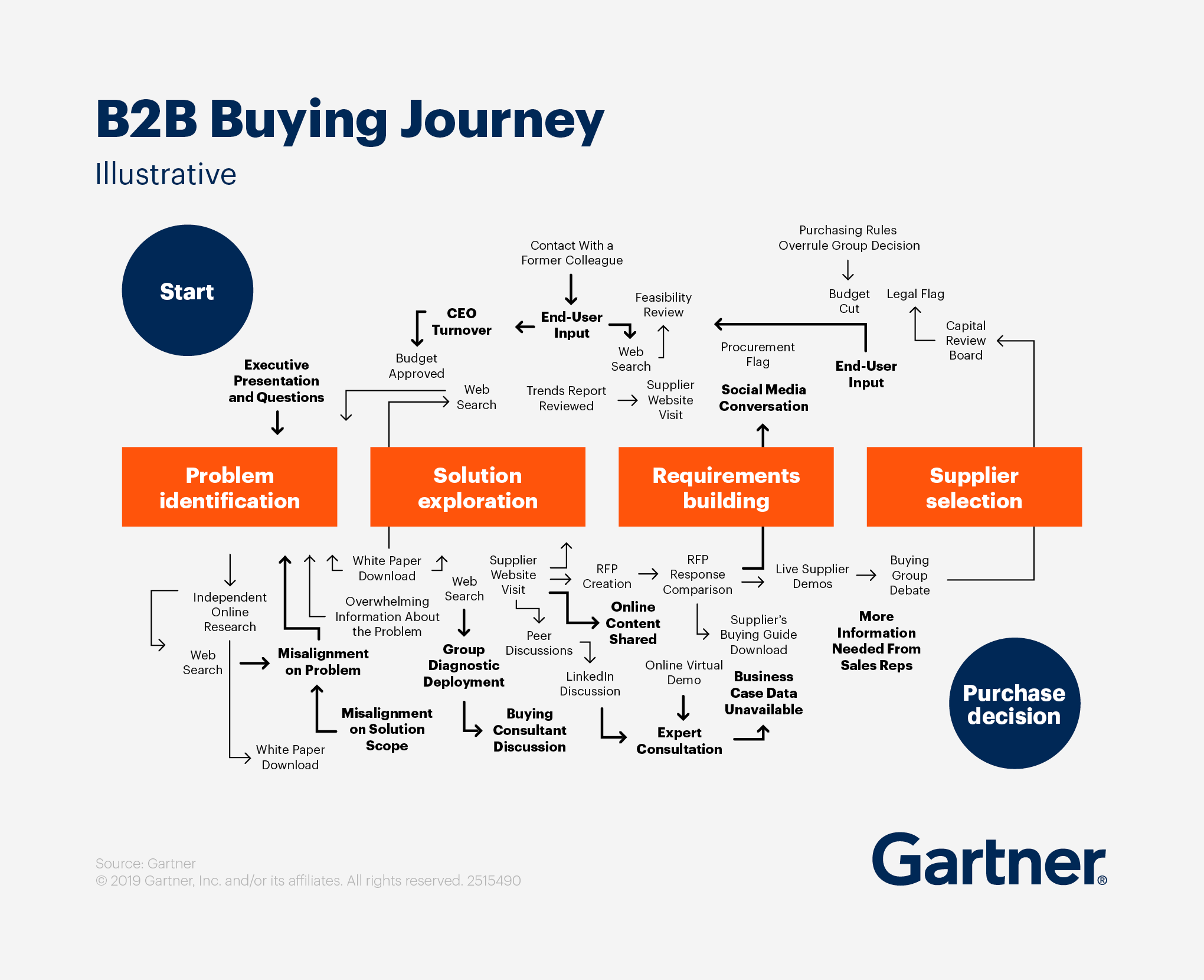In a rapidly evolving landscape where decision-makers are increasingly relying on online research, let's explores the challenges faced by B2B field marketers and the pitfalls of fragmented activities.
You'll be familiar with the below buying journey, I’m sure
Source: https://www.gartner.com/en/sales/insights/b2b-buying-journey
And you’ll be more than aware of how Decision-makers are no longer relying on sales conversations; instead, they're dedicating more time to researching online, forging their own way through a wealth of information and options. This shift has fundamentally changed the game for B2B field marketers.
The Pitfalls of Piecemeal Activities
With the ever-expanding list of responsibilities, it's easy for B2B field marketers to fall into the trap of piecemeal activities. These come from a variety of pressures and field marketers often find themselves in the hot seat, squeezed by competing demands. Does this sound familiar?
"Hey, our competitors are at X event; we can't afford to miss out!" Yours demandingly, Sales.
Or perhaps
"Our messaging must be consistent across all regions. And we've also invested heavily in this new technology; it needs to deliver results. Find ways to integrate it into local campaigns. Quick please, Central Marketing.
The pressure on B2B field marketers is palpable. Grappling with competing demands, trying to find the right balance while ensuring valuable customer engagement. But the job isn’t to be led by Sales or Marketing. It’s to be customer-led. It always has been.
So that event Sales are insisting you attend. The one who’s costs have increased 30% to recoup the damage post covid, will it provide the right platform for you to demonstrate value to customers and prospects? Will this ‘consistent messaging’ work in my field? How will this technology add value to my customers experience and does it work within my plans?
Time
Perhaps the most pressing issue from this is the scarcity of time and its relationship with value. B2B field marketers can find themselves racing against the clock, leaving little room for strategic thinking, innovation, and value-driven activities. So what’s needed? How can B2B field marketers practically strike the right balance between the tactical and the strategic?
Enter the CMO and CFO Mindset
More and more field marketers are identifying themselves as ‘regional kind of CMO’. And I’m all for it. Not only that, but when you combine this mindset with that of a CFOs, b2b field marketers will deliver more value to their customers, their colleagues, partners and themselves. Let’s take a closer look….
A CMO mindset is characterized by a relentless pursuit of growth and a keen focus on customer-centric strategies. Field marketers adopting this mindset understand that growth isn't a byproduct; it's the goal.
Field marketers don't aim to be all things to all people. Instead, they identify where they can deliver the most value to their customers, backed by well-researched data and insights. It's about precision rather than scattergun or piecemeal approaches delivered through a lot of coffee.
A CFO mindset brings that laser focus on investment optimisation. For field marketers, this means eliminating what doesn't drive value and reallocating resources to strategies based on data-driven customer behaviours. Taking a value driven approach to marketing planning helps drive better conversations internally with corporate and help allocate time and budget to the right channels in region.
Field marketers are getting good at being more bullish in cutting out what's not driving results and channelling those resources into new avenues with a stronger likelihood of customer growth. And let’s face it, marketing budget isn’t going to skyrocket. There will be trade-offs.
Now, it’s one thing to say, ‘adopt a certain mindset’ and ‘step into difficult conversations with your colleagues, all will be fine!’ It’s clearly not that easy. So, it helps to have back up.
The Power of Integrated Measurement
We’re all recognising the importance of integrated measurement more and more. That system that combines various marketing efforts, data sources, and technologies to provide a holistic view of marketing performance. But building and optimizing this measurement system is hard as hell. It involves combining data from various sources, employing suitable technology, and increasingly considering environmental implications. It goes beyond revenue generation and performance marketing efforts, aiming to showcase the overall value your marketing efforts are contributing full funnel.
By better quantifying and qualifying the value of your efforts across the entire marketing funnel, you gain the insights needed to make data-driven decisions and ensure your strategies are aligned with customer needs and behaviours. And you can ladder it up to central and cross match wider fields to support the total view. And you can use it to qualify whether those last-minute demands are justified, or whether you need to step into the arena around what’s right for the customer.
Embracing Channel Partnerships
Channel partners are finally seeing the attention they badly needed and deserve. Often holding the key to reaching and influencing your customers, B2B field marketers are leaning in more, moving away from badging and tagging and into true collaboration. It also comes from necessity on many levels. This is also about being smart with where the most valuable time is being spent. If your sales in the field are predominantly coming through partners, that’s well worth investing your time and dollars into.
The time is now to push the button.
2024 sees B2B field marketers rewriting the playbook and combining the approach of a CMO and CFO to help focus on and deliver the most impactful strategy and execution for their market. The strategic shift from chaotic juggling to precision-focused strategies is happening. No doubt it can lead to a few buttons being pushed along the way…. but it’s worth it.





